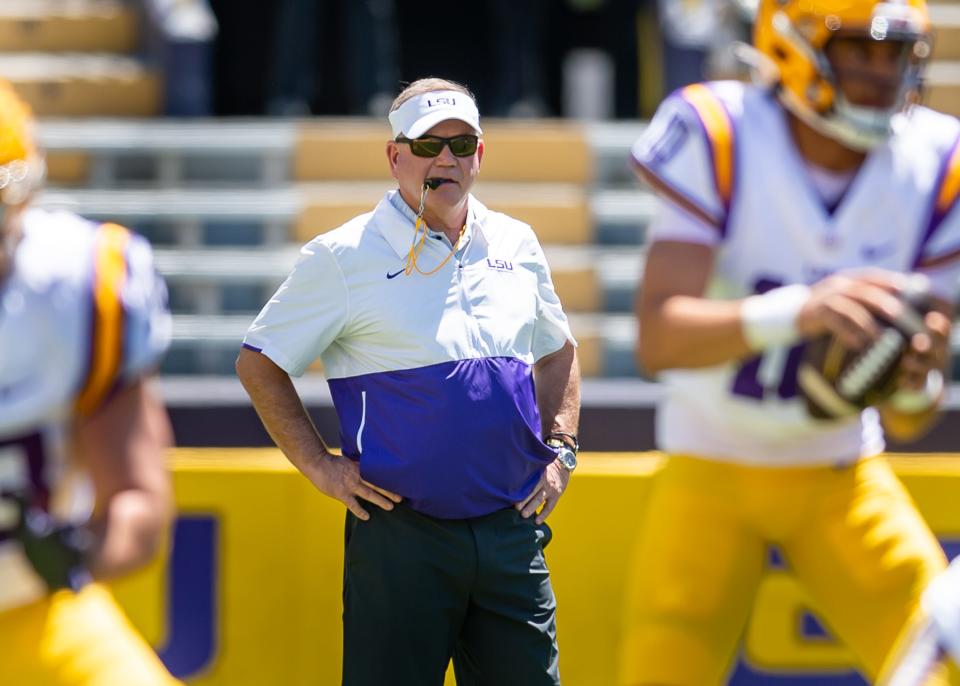Loose injury lips won't sink football ships at Florida or LSU or anywhere else | Whitley
Dan Mullen’s first press conference of fall camp at Mississippi State was going swimmingly in 2012. Then a reporter ventured into forbidden territory.
He asked if a couple of banged-up players would be practicing. The guy might as well have asked for the password to Mullen’s bank account.
“Come back when you have some questions,” Mullen said. “It’s a policy. It’s pretty simple, right?”
The policy was Mullen (and a lot of other coaches) did not discuss injuries.
It is not that simple.
The policy is frustrating to reporters, fans and — most of all — gamblers. Brian Kelly had a eureka moment about it before LSU opened training camp last week.
In an SEC first, he will start formally reporting all injuries on Mondays and Thursdays. Players will be listed as probable, questionable, doubtful or out.
“It probably took me too long to come to this realization,” Kelly said.
He’s not the only one. More and more coaches are realizing that being tight-lipped has reached the point of diminishing returns.
Policy maker: Brian Kelly will set trend with LSU football injury reports in 2023.
No joke?: 'Talent level is the same.' Alabama football transfer Dameion George compares Gators to Tide
It’s been slow in coming. The impetus began when the U.S. Supreme Court legalized sports gambling in 2018.
Critics said that would heighten the thirst for inside information. Players, trainers, coaches and hangers-on could inadvertently or intentionally tip people off whether a star QB like, say, Bryce Young, might miss a game.
The Big Ten actually proposed a standardized reporting system. It was shot down by the old guard that considers injury reports the equivalent of the U.S. nuclear codes.
Now, lo and behold, look what’s happening. Alabama baseball coach Brian Bohannon was fired after allegedly betting on his team to lose a game. Seven Iowa State athletes have been charged in a gambling probe.
The gambling chickens are coming home to roost, and schools should have as little “inside info” as possible if they want to stay clean.
“I don't want it to be a situation where (hiding an injury or illness) causes something to the point where somebody loses their job or loses their eligibility,” Kelly said. “To me that's a bigger issue than, 'Well, we got a tactical advantage today because we found out he was playing.’”
The NFL adopted an injury reporting policy in 1947, calling it “a cornerstone of public confidence.” But even if bookies didn’t exist, fans shouldn’t find out right before kickoff that the starting tailback suffered a torn ACL five days earlier in practice.
Just don’t tell that to guys like Mullen, who almost walked out of that first press conference when a reporter pressed him about injuries.
“Are you going to have any real questions?” he asked.
Three years later, a fan called Mullen’s radio show and asked for an update on an injured quarterback.
“We don’t talk about injuries in our program,” Mullen said. “If you want to find out about our guys, buy a ticket and show up on Saturday.”
Mullen is gone from coaching, but that mindset remains. Ryan Day could tell you about injuries at Ohio State, but then he’d have to kill you.
Nick Saban runs hot and cold. After Young reinjured a shoulder last year, Saban kept everyone guessing whether his QB would be ready for the next game against Texas A&M. The reality was Young would have needed a faith healer to play in that game.

That mindset has some merit. Coaches fear that opposing teams might target a player’s injury and try to knock him out of the game.
Colleges also have medical privacy rules that the NFL doesn’t have to deal with. But those can be worked around.
As for secrecy providing a tactical advantage, Kelly isn’t buying it.
“I don’t know that I’ve ever went into a game and gone, ‘Wow, we’ve got an upper hand today because I didn’t know he was playing, or I did know he was playing,'” he said. “I just think it’s overrated.”
Mullen loosened up slightly when he got to Florida. At least he didn’t walk out of any press conferences when asked about injuries. Billy Napier doesn’t go into great detail with injuries, but he releases a report every Wednesday that lists players with "upper" and "lower" body injuries, and whether they are out or questionable.
“We made a decision a long time ago to be a pretty open book,” he said. “I think that the NFL’s got it figured out.”
It’s time everybody figured it out that fans shouldn’t have to buy a ticket to get basic information. Injury questions are “real” questions, and they’re becoming more so every day.
David Whitley is The Gainesville Sun's sports columnist. Contact him at dwhitley@gannett.com. Follow him on Twitter @DavidEWhitley
This article originally appeared on The Gainesville Sun: College football should take LSU football's Brian Kelly's injury reports

